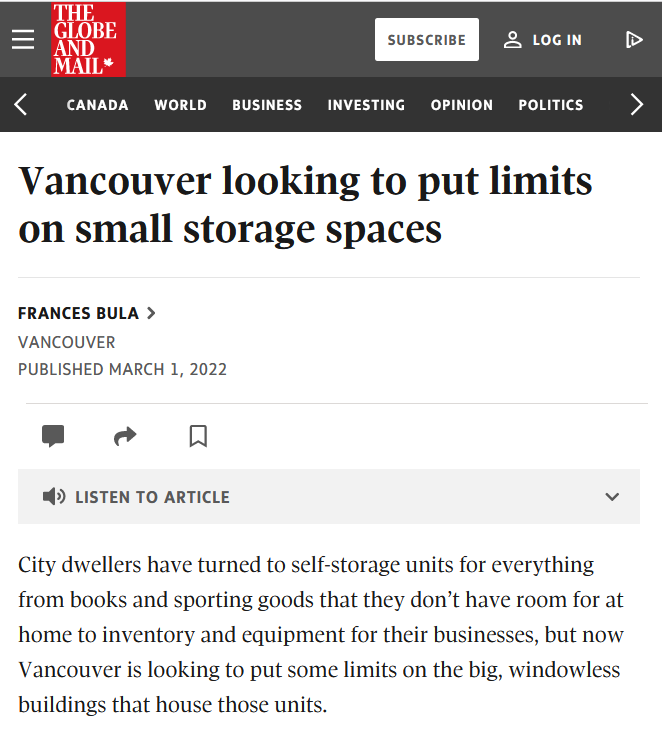THE GLOBE AND MAIL | March 1, 2022 | By Frances Bula, Vancouver BC
City dwellers have turned to self-storage units for everything from books and sporting goods that they don’t have room for at home to inventory and equipment for their businesses, but now Vancouver is looking to put some limits on the big, windowless buildings that house those units.
The move comes after a recent wave of giant bunkers went up in a few prominent places around the city, including a hilltop on Clark Drive.
City staff are recommending in a report going to council Tuesday that mini warehouses be banned from industrial areas near transit, something that would have prohibited the Pockit Self Storage development near the VCC-Clark SkyTrain station, and require self-storage buildings in any industrial zone to have non-storage uses on the ground floor.
“The continued construction of standalone self-storage facilities poses a threat to intensification in industrial areas,” said the report, warning that the storage operations make it challenging for other types of industries to compete financially for land. Staff consulted with officials in Miami, San Francisco and New York, cities which have faced similar challenges, on solutions for the issue.
The city’s move would affect large swathes of land in the Mount Pleasant industrial area and the industrial zone south of Marine Drive, as well as areas near the Rupert, Renfrew and VCC-Clark stations.
But people who work with the self-storage business say Vancouver should be careful about limiting those mini warehouse buildings too stringently. They say it’s an inaccurate stereotype that these facilities are just junk rooms in the sky for people living in too-small condos.
Instead they are acting as an important base for fledging commercial enterprises and helping even established retail businesses to cut down on costs by giving them a place to store inventory off-site.
“By having storage within municipalities, it is allowing a lot more small businesses to operate. Storage plays a vital role in a dynamic city,” said Patrick Wood, a broker with William Wright, who has developed a specialty in that sector.
A local operator says that even some very large retail operations, like chain hardware and grocery stores, are using mini warehouses to reduce the amount of space they have to rent to store things in more expensive parts of the city. And those storage centres are evolving to facilitate that by providing front desks where packages can be picked up and dropped off by couriers and delivery services.
“I visited a couple of buildings in the Downtown Eastside recently and the level of activity was awesome,” said Robert Madsen, who is a director with the Canadian Self-Storage Association and the owner of the U-Lock Mini-Storage Group.
And David Allan, whose family company runs 42 warehouses in Manitoba, Ontario, New Brunswick and Nova Scotia, said there’s a danger that city planners won’t understand the role such facilities are playing. He said storage operators are seeing a dramatic change as small businesses use the lockers as their storage base.
“In an urban centre, we’re seeing them become real hubs of economic activity.”
Mr. Allan said that in Toronto at least, it’s not really long-term condo dwellers who tend to use them. Instead, when residential users lease storage units, it’s usually because of a short-term space crunch. They need to empty out a residence because of one of the five major life events: death, disaster, divorce, dislocation, and delays.
“No one wakes up and says ‘Let’s go buy a storage unit.’”
The city’s report indicates there are four mini-warehouses under construction and two in development review that are within a kilometer of a transit station. Eight were built between 2000 and 2009, and nine were built or proposed since 2020.
